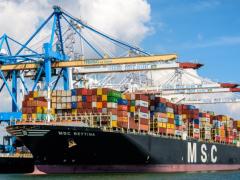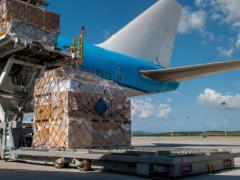Drone technology is transforming last-mile delivery of temperature- sensitive cargo to remote African villages and clinics. Announced at the 2025 Paris Air Show, a partnership between Windracers and Aviation Sans Frontières will use Windracers' ULTRA MK2 autonomous drone, which can carry up to 150kg over 1 000km, and fly for 10 hours, according to the company. The drone operates independently, with proprietary autopilot systems and multi-mission configurations, including a tri- door system for payload drops. Christian Georlette, chair of Aviation Sans Frontières International, said: “Aviation Sans Frontières was an early adopter of drones as a cost-effective and impactful means of delivery for humanitarian actors, and today drones are at the core of Aviation Sans Frontières’ forward strategy. Windracers’ ULTRA carries sizeable payloads per trip at a lower cost while taking human pilots out of harm’s way.” “Logistics is the backbone of humanitarian aid, often representing 60-80% of expenses depending on the sector of activity,” said Stephen Wright, founder and group executive chairman of Windracers. “We developed ULTRA with this exact idea in mind, to provide low-cost means of delivering humanitarian aid to hard-to-reach locations for people who need help the most.” A dedicated pilot drone base has been established in Malawi. The next programme phase will test drone deliveries of vaccines and temperature- sensitive medical supplies to evaluate their integration into public health logistics. The partnership also addresses local workforce training and regulatory alignment, according to the companies. Drone delivery systems have already been successful in Africa. In 2019, Ghana partnered with Zipline to deliver medical supplies from local distribution centres directly to health facilities through a network of autonomous drones. At the height of the Covid-19 pandemic, Zipline delivered nearly eight million doses of vaccine using drones, according to the company. Zipline originally started delivering blood and medical products in Rwanda in 2016 and has since expanded to food, retail, agricultural products, and animal health products. The company says it uses two platforms – one for long-range delivery and the other for precise home delivery. It has operations in the United States, Rwanda, Ghana, Nigeria, Côte d’Ivoire, Kenya and Japan. End-to-end logistics chains are being built around drone technology. In 2023 Wingcopter signed a memorandum of understanding with Siemens Healthineers to develop and roll out an integrated drone delivery service solution to transport various laboratory diagnostics materials as well as other medical supplies in Africa. Not all projects have been successful. The South African National Blood Service had to ground a project to use drones to deliver blood to remote places “due to loss of telemetry beyond 5km, violating safety specifications, with no further support from the supplier”, according to the organisation. A number of South African companies have developed or are developing drones for local and African use. While the focus is on surveillance, mapping or military use, C-Drones has an autonomous unit with a 15kg payload and heating or cooling functions. ER












